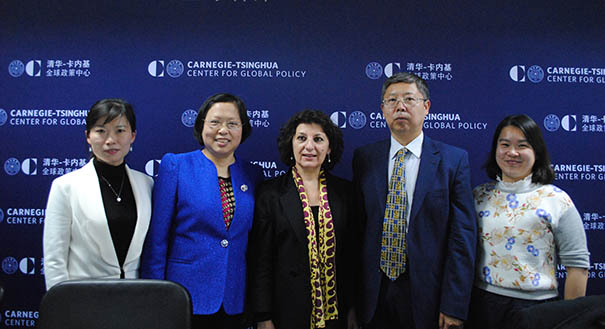Registration
You will receive an email confirming your registration.
In 2013, China launched its Belt and Road Initiative, also called One Belt One Road, to promote infrastructure development and create trade routes that would link China to the rest of Asia and Europe. Several Asian countries, particularly Pakistan, have welcomed the engagement, but the initiative has garnered less interest in Europe.
Carnegie-Tsinghua’s Zhang Lihua moderated a discussion with Chinese and international experts on the potential impact of One Belt One Road on Europe—with a particular focus on the United Kingdom, Germany, Greece, and Eastern Europe.
This event was off the record.
Discussion Highlights
- Diverse Perceptions in European Countries: Discussants noted differing trends between Eastern and Western European countries’ perceptions of the Belt and Road Initiative. One panelist said that the United Kingdom is relatively on the outskirts of the initiative, while Greece and many Balkan countries are more involved and active within the initiative. These differing levels of integration in the project, one panelist concluded, mean that each European country has its own unique relationship with China.
- The Influence of Media Coverage: Many panelists argued Europe’s media coverage of Chinese socio-political issues tends to be more negative, including in countries where the government is open to the Belt and Road Initiative and seeks to build a meaningful relationship with China, such as Greece. This, they said, is impeding deeper engagement in Europe with China’s initiative. One panelist pointed out that the UK had little media coverage of the initiative in its domestic media outlets. Discussants said that in Western Europe in particular, absent or poor media coverage is constraining the initiative’s reach.
- An Unclear Vision: Many European countries don’t separate politics from economics, panelists said. This, one panelist noted, can often cause Western European countries to view the Belt and Road Initiative as both an economic program and a political agreement. As such, the panelist said that the initiative’s seemingly unclear vision is an obstacle to its potential success in many European countries. The discussants agreed that public opinion and governments in these countries tend to fear China’s political influence, believing that the initiative is designed for China’s long-term benefit. This viewpoint, a panelist added, is exacerbated by the fact that many European countries are becoming increasingly inward-looking.
- Further Obstacles: A panelist remarked that coordinating EU law with the Belt and Road Initiative could be difficult to achieve, which further inhibits the initiative’s success in the region. Several discussants argued that the initiative should be carried out on a project-by-project basis, rather than country-by-country, which could reinforce some governments’ reservations regarding the initiative’s political implications. But the degree of Chinese companies’ involvement in each project has raised other questions regarding sensitive areas such as labor division and human rights—areas where, panelists argued, China and European countries often clash both ideologically and in practice.
- Better Communication Needed: Discussants agreed that there are numerous misconceptions in Europe about the initiative’s vision and implications, especially in Western European countries. One panelist added that many European countries feel disconnected from the Belt and Road Initiative because it has been secondary to many recent internal events, such as the refugee crises. The result, the panelist continued, is that the initiative has been relatively neglected in news media outlets. In general, discussants said that China needs understand that Europe is not a single, homogenous entity, and should approach European countries through more intimate and personalized dialogues and negotiations.
Zhang Lihua
Zhang Lihua is a resident scholar at the Carnegie–Tsinghua Center for Global Policy where her program at the center examines how China's One Belt One Road initiative affects Europe.
Zhang Li
Zhang Li is an associate professor in the School of Journalism and Communication at Tsinghua University.
Wang Xiaoguang
Wang Xiaoguang is a research associate at the Academy of Chinese Energy Strategy at the China University of Petroleum.
Elena Avramidou
Elena Avramidou is an associate professor in the Department of History and the Center for Hellenic Studies at Peking University.
Kong Tianping
Kong Tianping is a professor in the Institute of European Studies at the Chinese Academy of Social Sciences.
